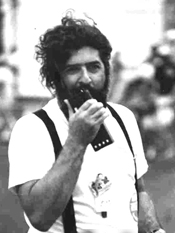 |
→ May 2007 Contents → Column
|
This is Personal
May 2007
|
 |
I remember when the word came in. I was home from school for the summer, doing full-time manual labor at my family's small weekly newspaper in Central Louisiana. The white concrete was hot that day on Boeuf Trace, "Cattle Trail" in Cajun French, which was the name of our recently paved street, running for a mile along palmetto-filled pastures. We were home for an afternoon meal when the heavy old black telephone receiver began ringing metallically in the kitchen. Maybe I sensed something, knew it wasn't one of my buds, because I did not rush to the phone as usual.
My father took the call.
He was standing at first. I watched the pale, disbelieving look grow on his face as he slowly and carefully sat on the kitchen stool, the phone poised a few inches from his ear, stopping to stare at it every few seconds like it was something horrible, something foul.
He listened to the voice, grew paler. Held to the windowsill like he was dizzy. I stood a few feet away and watched silently. Not wanting to intrude. Something was happening here, something was being told to my father. Something bad.
I do not remember who was on the phone, who called us first. But the voice told my father that his sister, Marguerite Gabour Lamport, and his brother's son, Mark Gabour, were dead. His sister-in-law, Mary Francis, and our cousin Mike were critically wounded. His brother, M.J., was tending them but it was not known if they would survive.
Mike, a cadet at the U.S. Air Force Academy, lived but his legs had been ruined forever from the shotgun blasts. His mother would be paralyzed from the neck down for the rest of her life.
They had been on a tour of the University of Texas tower. Where my two vacationing young brothers had also been exactly one week before, taken there by the same Lamports, who were all the family's favorite couple.
Only a few days later the cover of Time magazine held a heart-wrenching picture of our Uncle Bill walking in a trance alongside a stretcher that held Aunt Margie, her body covered by a bloody sheet. Uncle Bill, himself spattered with his wife's blood, was still holding his wife's hand as the attendants carried her to the waiting hearse. I cried when I saw it. We all did.
Our family was changed forever.
We seldom speak of it these days.
We never speak of it.
And I must apologize to my father and to my extended family if they see this article and think I should not have brought it up again. If I made us all hurt again.
But this is personal.
******
Today, here in New Orleans, which has seen its share of smaller single-event massacres (the Howard Johnson sniper, New Year's Eve 1972), but retains a pattern of more regular ongoing bloodshed, a Letter to the Editor was published in the Times-Picayune in the aftermath of the Virginia Tech killings.
A "Professor of Law" at Southern University, a man named M.B. Franks, wrote the letter, published under the title, "Shooting Back Could Save Lives." As a closing paragraph he wrote: "The unfortunate events in Virginia suggest that defensive weapons are needed even more on college campuses than in the shopping malls and theatres and restaurants."
He was serious. And thus the quotation marks around his title.
One question immediately came to mind: Does this man, this "Professor," carry a firearm to class? Would he? Can such a person possibly be a worthy mentor to our children, much less to students of the law?
I've always believed the posturing of the NRA – Charlton Heston screaming at a podium that the only way the Feds would take his musket was from his "cold and dead hands" – was a salacious joke. Even so, I excused the actor. Charlton may have seen "Ben Hur" once too often in his elder years. Maybe he didn't remember his part in "The Ten Commandments" as well.
But today comes a "Professor of Law" declaring that the population of the United States of America should arm itself against itself.
I am aghast.
Writing further seems a waste. Franks and his ilk will never believe that a civilized country can exist without a vast arsenal of killing weapons in every closet. And I myself must admit that after the Katrina barbarism and its fallout – hordes of semi-humans walking the streets with many weapons, with few police and no conscience to restrain them – I have considered the possibility of purchasing a gun myself.
I have not done so. Yet.
But when our universities start preaching the use of the physical instruments of death, rather than logic and aesthetics and moral values, then I begin to wonder.
I begin to remember my Aunt Margie, as luminous and joyful a creature as ever walked the earth. I remember my cousin Mark, a great soft-spoken spirit, full of the happiness and innocence of youth.
I begin to wonder what it will take to simply live life without taking life.
Teach that, Professor Franks, and I will take the class.
© Jim Gabour
|
|
Back to May 2007 Contents
|
|